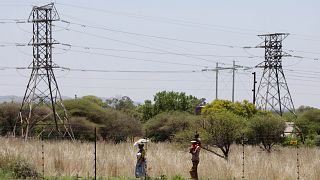Focus Africa
The youth in Africa make up bulk of the population. It is expected that youth in the continent could surpass the 1 billion mark by the year 2050. With this has come the rising challenge of unemployment as current estimates indicate that about 45 percent of young university graduates in Africa are unemployed.
South Africa is no exception. In this second part of the Road to the World Economic Forum on Africa, we look at what South Africa’s government is doing not only to foster an environment that creates job seekers, but also job creators.
In today’s cut-throat world going beyond the necessary is increasingly becoming important and innovation plays a significant role in in how business is conducted. Creating new ideas as well as modifying existing ones has become the norm, more so in a fast-paced society such as South Africa.
The Innovation Hub in South Africa’s administrative capital Pretoria, is among the vehicles that the government is using to to encourage entrepreneurship among South Africa’s youth, as Tsietsi Maleho, General Manager, Skills Development, M&E and Partnerships at the hub explains.
“In general we incubate companies in sectors of bio-economy, these are bio-tech companies, we also incubate companies in green, these are renewable energy companies and we lastly incubate companies in ICT-smart industries. In total on the park there’s close to about 250 companies.”
Established 16 years ago, the technology park also supports upcoming entrepreneurs in townships.
“In total we have got about seven. They are called eKasi Labs, these are incubation programs in the townships. By the end of next year, we’ll most probably have about 10 of these eKasi labs programs. In total we’ve got about 150 entrepreneurs that we are incubating in the townships and I think is via through the creation of small business that we will be able to make a dent in the unemployment rate,” he added.
Innovation is not only confined in the technology space, at the Maboneng Precinct in downtown Johannesburg, the streets are alive. Turning what was considered a no-go zone to a vibrant community in just under a decade.
Bheki Dube, Founding Director of Curocity Hostels, which offer affordable accommodation to those willing to experience some of South Africa’s main cities just like a local would, tells of how Maboneng has evolved.
“Obviously with developments and restaurants its become the silicon valley of entrepreneurship within Johannesburg itself. So we’ve got right now over 2,000 start-up businesses that have started within the area itself. These range from architectural firms, to creative studios, to restaurants.”
Still, with all these new ideas, education plays a significant role in equipping tomorrow’s business leaders with the relevant skills set.
Some institutions of higher learning in South Africa have programs that nurture entrepreneurs from diverse fields.
“We have something called the enterprise development academy, so this is part of our business which is sponsored largely by large businesses but offers paid for entrepreneurship education programs to small start-ups and small entrepreneurs.
So the large businesses support small businesses in their growth phases and we have put more than 1,700 entrepreneurs through that program with the support of the benefactors who’ve put money into that initiative,” said Howard Fox, Executive Director, Marketing and IT at the Gordon Institute of Business Science.
Across South Africa a new crop of entrepreneurs continue to emerge. One such example is Neil du Preez, Founder of Mellow Cabs, which are electric mini-cabs that provide, low-cost and eco- friendly transport.
Neil narrates his entrepreneurial journey; “I guess the inspiration of Mellow Cabs was growing up in South Africa we didn’t have access to public transport which I felt was a really big problem for us. Public transport is really an enabler for the economy to grow, transport of people and goods really needed in Africa.”
His journey has not been without challenges.
“Oh yes, it was quite challenging actually. Initially I had to fund the project myself. I sold my family house to keep us afloat and then as the project evolved we were lucky enough to find angel investment. The angel investment also carried us quite a while, helped a lot with research and development and then quite recently, the South African Industrial Development Corporation was kind enough to lend their support for the project as well.”
The hurdles did not deter Neil who already has about 20 employees and bigger plans ahead.
“We are going into full production with a fleet of 40 vehicles. We’ve had very successful conversations with expansions in Kenya and Nigeria which I think will be our next African steps and then we have also a pilot project lined up in Belgium and another one in France.”













Go to video
WAFCON 2024/25: Road to the semi-finals begins
Go to video
U.S deportees put in solitary confinement in Eswatini: government spokesperson
11:19
Cocoa is under pressure while East African economy is on the rise {Business Africa}
Go to video
Togo holds first local elections since controversial power shift
Go to video
"No Substance": Burna Boy apologises for controversial statement about Afrobeats
01:09
Prince Harry visits Angola in repeat of Diana's iconic 1997 trip.